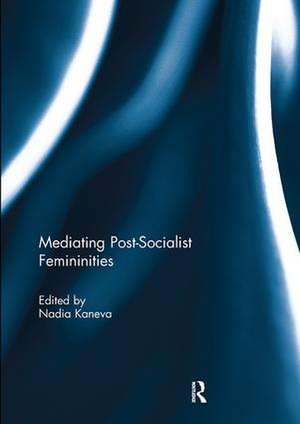Mediating Post-Socialist Femininities
Editat de Nadia Kanevaen Limba Engleză Paperback – 16 iun 2017
In seeking answers to such questions, this volume highlights the need to reconsider feminism as a political and theoretical project with many faces. It bridges research on the mediation of post-socialist femininities with broader concerns about the transnational trajectories of feminism today.
This book was originally published as a special issue of Feminist Media Studies.
Preț: 318.90 lei
Preț vechi: 364.17 lei
-12% Nou
Puncte Express: 478
Preț estimativ în valută:
61.02€ • 63.05$ • 50.76£
61.02€ • 63.05$ • 50.76£
Carte tipărită la comandă
Livrare economică 19 martie-02 aprilie
Preluare comenzi: 021 569.72.76
Specificații
ISBN-13: 9781138099166
ISBN-10: 1138099163
Pagini: 168
Dimensiuni: 174 x 246 mm
Greutate: 0.45 kg
Ediția:1
Editura: Taylor & Francis
Colecția Routledge
Locul publicării:Oxford, United Kingdom
ISBN-10: 1138099163
Pagini: 168
Dimensiuni: 174 x 246 mm
Greutate: 0.45 kg
Ediția:1
Editura: Taylor & Francis
Colecția Routledge
Locul publicării:Oxford, United Kingdom
Public țintă
Postgraduate and UndergraduateCuprins
1. Mediating Post-Socialist Femininities: Contested histories and visibilities 2. Becoming Visible in The Digital Age: The class and media dimensions of the Pussy Riot affair 3. Feminine Libidinal Entrepreneurship: Towards a reparative reading of the sponzoruša in turbo folk 4. Feminine Voice In Poland: The case of Danuta Wałęsa 5. Watching Pink Reality TV: Gendered commercial ethno-nationalism in Bosnia and Herzegovina 6. Old Title, New Traditions: Negotiating ideals of femininity in Krest’ianka magazine 7. The Egoist Lifestyle: Gender, community, and the "new generation" of post-communist Bulgaria 8. Between Sovietism and Americanization: Ideals of femininity during and after the Cold War in Finland
Descriere
This book examines how popular media re-constructs ideas and ideals of femininity in the post-socialist cultural space. The authors explore how post-socialist women have engaged with media as media producers and consumers, as well as objects of media representation, and what the consequences are of the commodification of femininity in the post-socialist context. This book highlights the need to reconsider feminism as a political and theoretical project with many faces, bridging research on the mediation of post-socialist femininities with broader concerns about the transnational trajectories of feminism today. It was originally published as a special issue of Feminist Media Studies.
